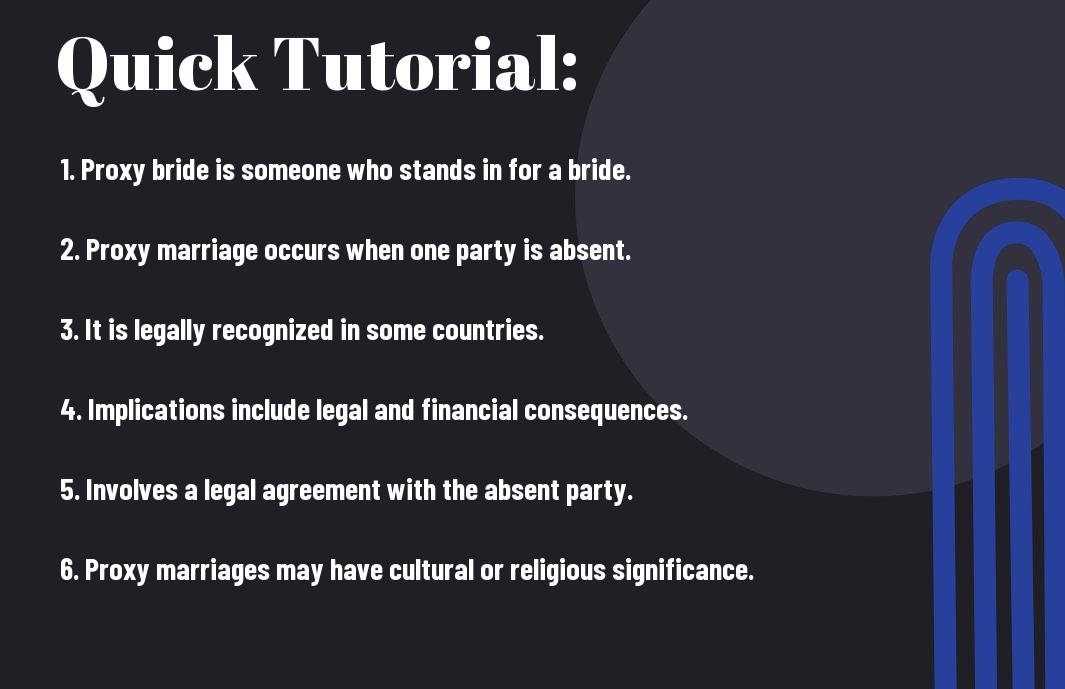Have you ever heard of a proxy bride and wondered what it means? In this tutorial, I will explain the concept of proxy marriage and its implications. A proxy bride is a woman who is married on behalf of another person, typically in a foreign country where one of the parties is unable to be physically present. This practice, while rare, has significant legal and cultural implications. It is crucial to understand the potential dangers and benefits associated with proxy marriages before deciding to enter into one or support its practice. Join me as I delve into this fascinating yet controversial topic.
Key Takeaways:
- Legal Implications: Proxy marriage is a legal marriage ceremony where one or both of the individuals being united are not physically present at the ceremony.
- Historical Context: The concept of proxy marriage dates back to the Middle Ages and was often used for political or strategic alliance reasons.
- Modern Application: Proxy marriage is still practiced in some parts of the world, particularly in cases where one or both parties are unable to physically attend the ceremony for reasons such as military service or immigration restrictions.
- Challenges and Controversies: Proxy marriage can present legal and logistical challenges, as well as ethical questions about consent and agency.
- Legal Recognition: The legal recognition of proxy marriages varies by country, and in some cases, it may not be recognized at all.
Understanding the Concept of Proxy Marriage
Some cultures and legal systems recognize the practice of proxy marriage, also known as a proxy wedding. In this type of marriage, one or both parties are not physically present at the wedding ceremony, but are represented by others. The proxy stands in for the absent individual and the ceremony is conducted as if both parties are present. This practice is often utilized when one or both of the individuals are unable to be present due to reasons such as military service, incarceration, or immigration restrictions.
Legal and Social Implications
A proxy marriage can have legal and social implications for the individuals involved. In some jurisdictions, a proxy marriage is legally binding and recognized as a valid marriage. However, in others, it may not be legally recognized, which can impact the rights and benefits of the married individuals. Socially, a proxy marriage may also be viewed differently within different communities, leading to potential stigma or acceptance of the union.
Comparison to Traditional Marriage
When comparing proxy marriage to traditional marriage, there are several key differences to consider. The table below outlines some of the distinctions between the two forms of marriage.
Traditional Marriage Proxy Marriage
Ceremony involves presence of both parties One or both parties are not physically present
Legal requirements and paperwork are completed in person Legal requirements and paperwork may be completed by proxy
Both parties have the opportunity to exchange vows and consent Proxy may or may not have the authority to provide consent on behalf of absent party
Navigating the Process of Proxy Marriage
If you have decided to pursue a proxy marriage, it is important to understand the process involved and the steps and requirements that you need to fulfill. This unconventional form of marriage requires careful navigation and understanding in order to ensure its legality and validity.
Steps and Requirements
When navigating the process of proxy marriage, there are several key steps and requirements that you must adhere to. These may include obtaining legal counsel to understand the specific laws and regulations in your jurisdiction, providing proof of identity and consent from both parties, and securing a proxy who is willing and able to stand in for you during the marriage ceremony. It is also important to ensure that all necessary documentation is properly completed and submitted to the relevant authorities.
Challenges and Considerations
One of the challenges that you may encounter when navigating the process of proxy marriage is the potential for complications or legal issues to arise. It is important to carefully consider the implications of entering into a proxy marriage, as there may be restrictions or limitations on the rights and benefits that you and your spouse are entitled to. Additionally, it is crucial to understand that not all jurisdictions recognize proxy marriages as legally valid, which can present further challenges and considerations.
By carefully navigating the process of proxy marriage and understanding the steps and requirements involved, you can ensure that your union is legally recognized and valid. It is important to consider the challenges and implications associated with proxy marriage, and to make informed decisions based on thorough research and understanding of the pertinent laws and regulations. Seeking legal counsel and guidance is crucial in order to navigate this process effectively and ensure that your proxy marriage is legally recognized.

Understanding the Concept of Proxy Marriage and Its Implications
Taking this into account, proxy marriages serve as a unique cultural and legal practice that has implications for both individuals and societies. As I have discussed, this type of marriage allows individuals to wed on behalf of someone who is unable to physically be present, often due to military deployment or immigration restrictions. However, the implications of proxy marriage can vary by jurisdiction and may have legal, financial, and emotional consequences for those involved. By understanding the complexities of proxy marriage, you can better appreciate the nuanced ways in which marriage is understood and practiced around the world.
FAQ
Q: What is a proxy bride?
A: A proxy bride is a woman who is married to a man through a representative stand-in, often in a ceremony where the bride is not physically present. This practice is also known as a proxy marriage.
Q: How does a proxy marriage work?
A: In a proxy marriage, the bride and groom are not physically present at the wedding ceremony. Instead, they are represented by proxies who stand in for them. The marriage is legally binding if it meets the requirements of the jurisdiction in which it takes place.
Q: What are the reasons for entering into a proxy marriage?
A: Proxy marriages are often conducted for various reasons, including immigration purposes, military deployment, or the inability of one or both parties to be physically present at the wedding ceremony.
Q: What are the legal implications of a proxy marriage?
A: The legal implications of a proxy marriage vary depending on the jurisdiction. Some countries and states recognize proxy marriages as legally binding, while others do not. It is important to consult with legal professionals to understand the specific implications in a particular legal jurisdiction.
Q: Are proxy marriages recognized internationally?
A: Proxy marriages may or may not be recognized internationally, depending on the laws of the countries involved. It is important to carefully research and understand the legal status of proxy marriages in the specific countries where recognition is sought.









